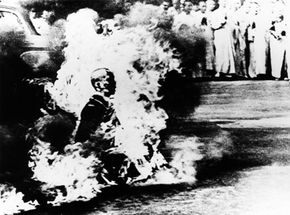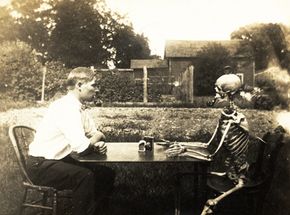Anna Gosline's recent article in New Scientist, entitled "How Does It Feel To Die?" got our hearts pumping here at HowStuffWorks. Gosline interviewed experts to find out what it's like to drown, fall from a tall building and ride the electric chair, among other terrible ways to die. This got us to thinking: Is there a worst way to die?
As it turns out, determining which mode of death is the worst way to go is subjective. There are impromptu polls on sites around the Internet (burning has a high ranking). But there's no consensus among professionals like physicians or funeral directors about which method is the least desirable way to exit this mortal coil. A person's fears may factor into his own personal worst way to die. The thought of falling to one's death from a tall building, for example, would probably scare the daylights out of someone who is afraid of heights, but wouldn't qualify as the worst death for someone else.
Advertisement
Awareness of the type of death and fear of the unknown can also make one kind of death more grisly than another. Dying in a plane crash is one example: The time between the airplane beginning its rapid descent and the moment of impact is more than long enough to generate terror. What's worse, depending on the circumstances, the passengers may remain conscious during the entire process. The plane is literally -- and unstoppably -- carrying its passengers to their probable deaths, and of this they are all totally aware.
With most forms of death, unconsciousness meets the victim before the grim reaper does, thus releasing the dying person from the fear that grips him. But the moments before death can be fraught with fear and pain.
A physician we interviewed recounts the story of a laborer in Africa who worked around vats of sulfuric acid -- one of the most caustic forms of acid. The man fell in one day. He quickly leapt out, but was covered in sulfuric acid, which immediately began to burn him chemically. In a panic and excruciating pain, the man ran outside. By the time his coworkers caught up to him, the man had essentially dissolved.
The acid burned the man to death, searing through skin, cauterizing blood vessels, and eating through organs until he died. The pain would be unbearable, and the circumstances irreversible. This is unquestionably a really bad way to die.
But what is it about stories like this? Why is it that on some primal level we feel the urge to imagine the man running madly about as his tissue fell away from his bones? Why do articles like Gosline's become so popular? In other words, why do we think about death? Read on to find out about an entire field of study dedicated to exploring death.
Advertisement




